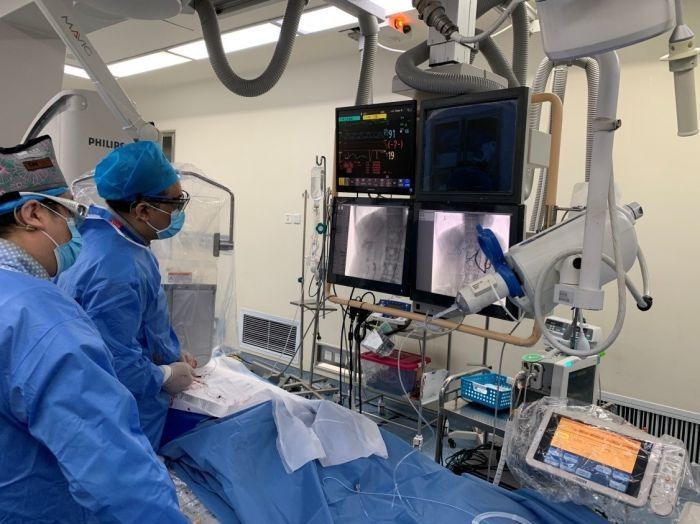Xinhua News from Xi’an on May 8 (intern reporter Wang Yiping) On May 6, the First Affiliated Hospital of Xi’an Jiaotong University (hereinafter referred to as “The First Affiliated Hospital of Xi’an Jiaotong University”), Department of Hepatobiliary Surgery-Department of Nuclear Medicine, Liver Cancer Nuclear Medicine On the basis of the previous scientific and meticulous evaluation, the MDT team successfully performed the first batch of yttrium [90Y] microsphere injection in my country and the first in the western region.
Shi Mou, a 59-year-old patient from Xi’an, visited the Department of Hepatobiliary Surgery of the First Affiliated Hospital of Xi’an Jiaotong University 2 months ago due to “physical examination found a liver mass”, and was initially diagnosed as a malignant liver tumor. The team of Professor Liu Qingguang from the Department of Hepatobiliary Surgery considered that the patient was older, and the liver tumor was large and poorly located, so it was not suitable for surgical treatment. In addition, the patient himself expressed that he was unwilling to accept systemic chemotherapy. Due to the complex condition of the patient, the First Affiliated Hospital of Xi’an Jiaotong University established a liver cancer radionuclide treatment MDT team composed of relevant experts from hepatobiliary surgery, nuclear medicine department, and interventional surgery center. After repeated research, discussion and scientific and meticulous demonstration by the MDT team, the patient was finally determined to use 90Y microspheres for the treatment of precise liver segmental radiological resection.

The MDT team of the First Affiliated Hospital of Xi’an Jiaotong University successfully performed 90Y microsphere liver cancer precise radioactive segmentectomy for the patient. Photo courtesy of the First Affiliated Hospital of Xi’an Jiaotong University issued by guangwang network)
In order to ensure that patients can have safe and good clinical treatment effects, the hospital cooperated with multiple departments to formulate a comprehensive and detailed 90Y microsphere interventional surgery plan, and invited Director Wang Yuan, a radiation safety supervision expert from the Shaanxi Provincial Department of Ecology and Environment, and Director Guo Jianxin of the Radiation Management Office of the First Affiliated Hospital of Xi’an Jiaotong University jointly led the monitoring team to enter the hospital to conduct on-site radiation safety monitoring and evaluation during the entire treatment process. Provide technical guidance for the safe development of diagnosis and treatment.
At noon on May 6th, Prof. Lv Yi, Vice President of Xi’an Jiaotong University, President of the First Affiliated Hospital, Professor Liu Qingguang, Vice President, Professor Wang Maode, Professor Zheng Xin of Hepatobiliary Surgery, and Director of the Department of Nuclear Medicine An expert team composed of Professor Yang Aimin and head nurse Xiao Juan of the interventional surgery center visited the interventional surgery center of the hospital to conduct consultation and evaluation of the patients again and guide the treatment. After a tense and orderly operation, the MDT team of Hepatobiliary Surgery-Department of Nuclear Medicine, Department of Hepatobiliary Surgery, Xi’an Jiaotong University, successfully performed precise radioactive hepatectomy with 90Y microspheres for the patient according to the established treatment plan, and the treatment process went smoothly.
Lu Yi said that the success of this operation marks that the First Affiliated Hospital of Xi’an Jiaotong University has another important and effective “weapon” in the comprehensive treatment of liver malignant tumors, which will bring more tumor patients. A new hope for treatment, and at the same time, it is hoped that the application of this new technology will promote the coordinated development of the hospital in multiple disciplines such as hepatobiliary surgery, nuclear medicine, medical imaging, and interventional surgery centers.